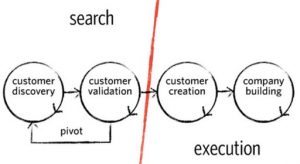As I ponder what I’ve learned over the years as an entrepreneur, I can confidently say that my biggest insights have come from my mistakes. I would like to share these educational pitfalls with all new entrepreneurs who are starting new businesses. The number of mistakes I made as a new entrepreneur was painfully high, but I would not change those learning experiences for anything. However, to assist the new entrepreneur who may read this article, I wanted to write about what I should have done differently in business. I would like to invite all seasoned entrepreneurs to add your experiences to this list.
I really don’t believe in failure. I believe that what looks like failure is actually a learning experience with the opportunity to move you in a different direction. Every time I start a new company, it is an opportunity not to repeat the past, but to learn from my past mistakes. After many years as an entrepreneur, I finally have the experience to identify how not to follow the same path of mistakes over and over again. I would like to share some of these insights with you, so you can avoid some of these mistakes, too.
My biggest learning experience in business was when I had almost lost it all. I did the typical entrepreneurial financing for the first restaurant I opened: I maxed out 10 credit cards, leveraged my kid’s college funds (they were five and six at the time), put my home up as collateral, borrowed as much money from family, friends, and fools as I could, and personally signed for everything. The following are a few pitfalls that I learned from this experience, which I would change if I had to do it over now.
- Admit you’re in trouble – The ego has killed more businesses than I can count. When the proverbial you-know-what is hitting the fan, most people, including myself, stick their heads in the sand. This was the worst thing I could have done when my restaurant venture was failing. These are the times you have to ask for help and look the problem straight in the eye. When I finally asked for help, it was amazing how many people came to my rescue—landlord, vendors, the bank, and other experts. It’s such a liberating experience when you learn exactly what’s going wrong, and the solution to fix it. For me, the problem was that my partners were stealing from the company (due to a lack of financial understanding). This was an easy fix, and then I moved on.
- Partners – This should be the most researched area when starting a company, and yet, is the least respected. A partnership dissolution is worse than a divorce. When it comes to money, everyone changes. I recommend a serious background check, a credential check of past employers, and a review of tax returns and personal financials. If your partners are unwilling to comply, move on. When I started the restaurant, I hired the first person who told me he had a great deal of restaurant experience, which I later found out was false. Writing a very clear job description for each partner helps during the times when the lines start getting blurred due to growth. Each partner has their strengths and weaknesses, so make sure they are outlined in detail.
- Operating agreement – This saved me from a partner I had in a consulting firm based out of New York City. After expanding the company 5X, he thought creating a mirror company and taking the clients was legitimate. (A little side note: beware of the attorneys who use boiler-plate operating agreements. There is no boiler-plate anything when it comes to partnerships and entrepreneurship. Every company and partnership is different, so you need to treat them with regard to their highly individualized needs. Example questions you should be asking are: what happens if one of the partners dies? Who gets the stock? Does it go to the spouse? If so, should they receive the same pay for doing no work? What happens if one of the partners leaves within a year? Do they get to cash out for only one year of service? What if a partner is caught stealing? The questions could go on forever, but make sure you ask the tough questions in the beginning—it will save you hundreds of thousands of dollars in the long run.)
- Financials – The number one reason businesses fail is a lack of understanding when it comes to financial statements. This was the biggest learning experience of my career, and it proved to be a game changer when I took control of it! When I started my first restaurant, I hired a business broker who built business plans and developed all of my financials, without explaining any of it to me. What I learned from this mistake was that whoever knows the numbers is in control. There are three financial statements you should know as well as your children:
-
-
- Cash Flow Statement. This is the lifeblood of the company, yet it is one of the least understood aspects. When there is no more cash, the lights go out. You must hoard cash in the beginning, middle, and end.
-
-
-
- Profit and Loss Statement. What we learn from this document is how much revenue comes in and how many expenses go out. The problem here is that your mortgage, accounts payables, etc. are not taken out of the bottom-line number called your net profit. So, it is possible to have a large net profit and still be bouncing checks—which is exactly what happened to me!
-
-
-
- Balance Sheet. The balance sheet is even less understood than the cash flow statement. The balance sheet helps you understand certain types of ratios. For example, I do an inventory ratio (how long my inventory is staying on my shelves), and a current ratio (how much short-term cash I have compared to short-term debt), so I know the health of the company.
-
- Know your market – Until I discovered the Customer Development process in conjunction with the Business Model Canvas methodology, I was a poke-and-hope type of guy. I believed the innovative idea I had would work because I said so. The idea that someone would try to start a company, without asking at least 100 people, companies, or potential customers what they think of their idea, just makes no sense. By taking time and doing the Customer Development process, along with a detailed Business Model Canvas, you develop a clear understanding of who your customer is, and what business model is best to deliver your product or service. This process has saved me a great deal of time, effort, and money. Below you can view an outline of the Business Development Model.
Business Development Model
If you are a new entrepreneur just starting out, try to remember that mistakes are a crucial part of your entrepreneurial journey, and more importantly, your success. You will make them time and time again, and while it may seem like the end of your business (or the world) at the time, remember to seek out the learning opportunities your mistakes have offered. But, also remember that you are not the first entrepreneur making mistakes out there. Many have done so before you, much like myself, and you can learn from us. If you’re going to make mistakes, make them original. Otherwise, why waste your time, money, and effort? Instead, ask questions from your mentors, and carefully study how to avoid common mistakes.



